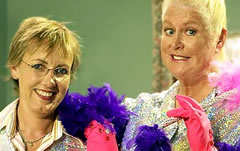Kim and Aggie Visit Ealing Hospital
Hospital responds to the Queens of Clean
Channel 4's Kim and Aggie will be shown running the rule over Ealing Hospital in a programme due to be broadcase tonight.
Aggie McKenzie and Kim Woodburn, who more usually visit peoples houses, came to the hospital at the invitation of local NHS Trust chief executive Fiona Wise. Overall their time there lasted three months. Ealing had the country's third worst MRSA infection rate in 2003 and poor working practises were exposed in undercover filming carried out by the Dispatches investigative programme. This was also broadcast on Channel 4.
The programme will show that the hospital now gets a clean bill of health as regards MRSA with microbiologists sent in by the pair unable to find any evidence of infection. However, the programme isn't all good news with dirty loo brushes and bloody dressings left for hours around the hospital. The microbiologist also found high levels of the bacteria Staphyloccus aureus at the unit. This can cause fatal blood poisoning or pneumonia.
Secret cameras showed that 65 per cent of visitors, 55 per cent of nurses and 93 per cent of doctors did not use anti-bacterial gel provided. (In mitigation, some of the doctors may have been using bedside gel supplies.) The programme recommends that more effort is put into getting people to carry out the simple task of washing their hands. Kim and Aggie say that the hospital cleaners were doing a good job but that there should be more of them advice that has been acted on since the programme was made.
The programme - When Kim and Aggie Went to Hospital - was broadcast on Channel 4 on Wednesday 30th August at 8pm.
Ealing Hospital NHS Trust said that they welcomed the showing of the programme, made after Kim and Aggie spent three months at the hospital between November 2005 and January 2006.
Trust Chief Executive, Fiona Wise, said: “The programme clearly shows that we allowed Kim and Aggie into our hospital to help highlight the many difficulties all hospitals face in controlling infections and ensuring strict cleanliness protocols and procedures are developed and adhered to. We recognised that they would not be holding back on criticism and highlighting areas where we have needed to improve.
“We also realised that this would be a film which needed to entertain as well as enlighten so that there were inevitably some scenes which were filmed in such a way as to overemphasise confrontation or poor standards. In fact, both Kim and Aggie found a lot which they praised us for too.
“There was never a time when we didn’t do everything we could to be as open and transparent as possible in allowing the film crews open access to our hospital. Our staff were utterly honest in their dealings with Kim and Aggie.
“We hope that the programme has gone some way to showing that Ealing is a very good hospital which has made significant improvements in the last two years and that the programme has opened people’s eyes to the fact that everybody has a part to play in controlling infection both inside and outside hospitals, and that this is a far more complex issue than many people think.”
The hospital’s Medical Director, Dr Bill Lynn, said: “We have been criticised on TV before for cleanliness on our wards and have been making a massive effort to improve cleanliness throughout the hospital. Patients and visitors now regularly acknowledge that our standards of cleaning in the hospital are very high. External independent assessors have also recently given the Trust top scores for cleanliness.
“We were approached by Talkback with an idea for them to come in and see just what we are doing now and whether we can do it even better in the future. We have welcomed this initiative as an innovative way to get new ideas and allow viewers to gain some idea of what we are doing and the challenges that the NHS face.
“Kim and Aggie gave us a fresh perspective on how we can continue to improve our cleaning standards and become a national exemplar for other hospitals. An action plan has been put in place and many of the issues raised in the programme were already, or have since, been addressed.”
September 7, 2006
